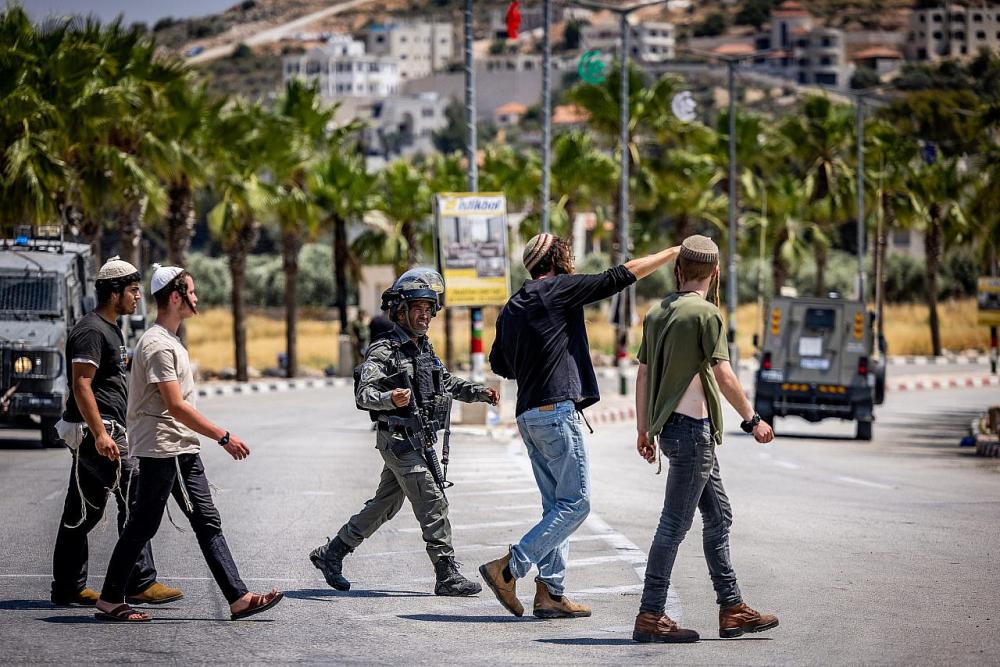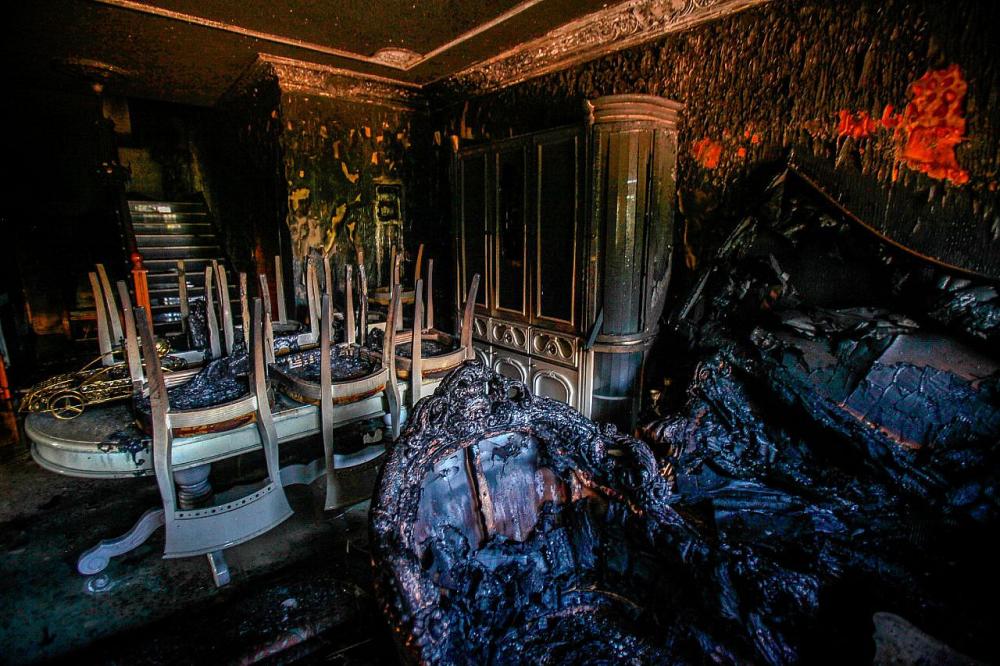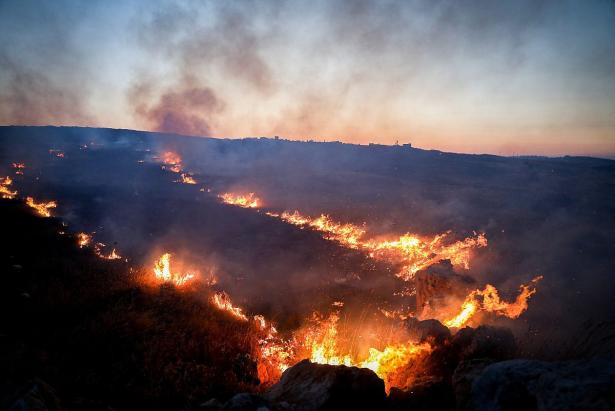Sometimes there is an event so extreme that it tears the veil of willful ignorance from the eyes of Jewish-Israeli society. The pogrom in Huwara last February, in which hundreds of settlers torched the Palestinian town in the occupied West Bank, was such an event. Last week’s pogroms in Turmus Ayya, Urif, and Umm Safa raised the curtain even higher, forcing many Israelis to stare straight at a reality that has long been present and can undoubtedly get worse.

But the main problem is not in the byproduct of occupation — Jewish settler terrorism — but in Israel’s routine activity in the territories. Indeed, the decision by the heads of the Israeli security establishment to label the pogroms as “terrorism” indicates that the veil has only been partially lifted; they simply don’t want Jewish terrorism to interfere with or embarrass the authority of the army, Shin Bet, and police.
Settlement is itself a violent act, whether it is done in concert with Israeli law or with the law following retroactively. It is violent because the settlers impose their presence on the natives and rob them of land, water, free movement, and basic human rights. It is an organized system of violence on behalf of the state.
The symbiosis between the army and the settlers is not limited to violence; it also exists in the understanding of their mission. The settlers explicitly define their mission as the Judaization of the area, and they do this effectively and consistently. The army’s mission is not to provide security for all residents in the territories — as international law requires of the occupying power — but rather to protect the settlers from the reactions of the native Palestinians, who are not allowed to defend themselves, neither with the help of the Palestinian security forces, nor by establishing their own national guard. The factor that determines whether a West Bank resident’s life and property will be protected is whether or not they are Jewish.

Israeli security forces argue with Jewish settlers at the entrance to the West Bank town of Turmus Ayya, June 21, 2023. (Yonatan Sindel/Flash90)
Expanding settlements as a response to the murder of Israelis — as senior government ministers pledged to do last week — is also not a harmless civil action. It is violence without immediate bloodshed, yet which will inevitably engender Palestinian resistance, followed by bloody army repression.
The Palestinians are tolerated only if they assimilate into the landscape, becoming inanimate objects that forgo their collective identity. But as long as they maintain that identity, they are by definition an enemy. The army and the Shin Bet will continue to control them with biometric and electromagnetic data that tracks their location, actions, and thoughts as expressed in phone calls and on social media. The Palestinians’ complete dependence on Israel for permits makes it easy for Israeli authorities to gather information about their family and medical conditions, sexual tendencies, personal weaknesses, and social structures, and to weaponize that information to force them into collaboration.
Jewish supremacy is clear as day, and the Palestinian people are bleeding physically and politically. However, as settlements expand and the army operates, the friction increases, and so too does the Palestinian motivation to react. Today, Palestinian violence has little expectation of liberating the West Bank; the power disparity between the parties is all too evident. Rather, it is intended to exact a price, any price, from the colonizers.
Dangerous frustration
This pushback frustrates the settlers. How is it possible that all their power and supremacy has still not erased Palestinian identity and resistance? That frustration is what drives pogroms like those we saw last week, which then pushes the army and government to use even more force to expand the settlement project. Just a few days ago, Col. (Res.) Moshe Hagar, head of the pre-military academy in the settlement of Beit Yatir, called for the destruction of a Palestinian city or village in order to teach the Palestinians a lesson. Meanwhile, Bezalel Smotrich, who serves both as finance minister and minister in charge of the civilian affairs in the West Bank, called any comparison between what he termed “Arab terror” and the “civilian counter-operations” both “wrong and dangerous.”

Damage caused to Palestinian homes and cars by Jewish settlers in the West Bank town of Turmus Ayya, June 21, 2023. (Nasser Ishtayeh/Flash90)
Their frustration today is greater than it was in the past. In the 1980s and ’90s, the settlers in the occupied territories transformed from a civil movement supported by the establishment into the establishment itself. They found their way into the executive levels of the government’s civil and security branches that control the Palestinian population and their land. Today, under the current far-right government, they have reached the height of their powers. They do not think for a moment about acknowledging the limitations of their power, because the vector of their political ambitions is linear and unequivocal. They must not retreat.
The idea of containing the conflict in order not to lose control — as the army, Shin Bet, and police are hoping to do — is unacceptable to those whose frustration is on par with their political and theological extremism. The settlers are pushing the security establishment to act in accordance with Hagar’s vision. Unlike in “Operation Defensive Shield” — when the Israeli army physically and politically destroyed the Palestinian Authority in 2002 through devastating urban invasions — today there is no leadership left to decimate. The PA under President Mahmoud Abbas has already done this in the service of Israel. The Israeli right’s call to launch “Defensive Shield II” is instead a call to action that places Palestinian civilians as the central target, rather than as mere acceptable collateral.
The end of the conflict and the two-state solution are no longer relevant to the Israeli public and the international community. Lacking a solution — or more accurately, the will to pursue one — foreign governments, including Arab states, have allowed Israel to create a single regime in the entire area between the river and the sea without having to officially declare annexation.
The fact that two different groups live under two sets of laws under a single sovereign means that Israel is implementing practices of apartheid, racial supremacy, and military rule not as a matter of foreign policy, but rather as its domestic policy.
This is why, for example, National Security Minister Itamar Ben Gvir is seeking to establish his own private militia, to have the power to put Israeli citizens in administrative detention, and to deepen the Shin Bet’s penetration into the lives of Palestinian citizens of Israel. And, in the wake of the events of May 2021, the Israeli army has now drawn up plans to act against Palestinian citizens in the event of a conflict.
Israel’s leaders are realizing that they need to further bend the law to their will, otherwise the identity of the entire area between the river and the sea will never be exclusively Jewish. And unfortunately, the Jewish Zionist left has neither the vision nor the courage to prevent this trend.
A version of this article was originally published in Hebrew in Local Call. Read it here.
Menachem Klein is professor of Political Science at Bar Ilan University. He was an advisor to the Israeli delegation in negotiations with the PLO in 2000 and was one of the leaders of the Geneva Initiative. His new book, Arafat and Abbas: Portraits of Leadership in a State Postponed, was just published by Hurst London and Oxford University Press New York.
+972 Magazine is nonprofit journalism based on the ground in Israel-Palestine. In order to safeguard our independent voice, we are proud to count you, our readers, as our most important supporters.


Spread the word